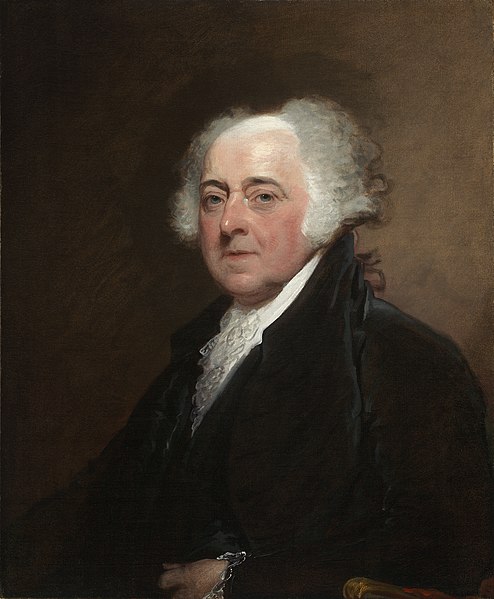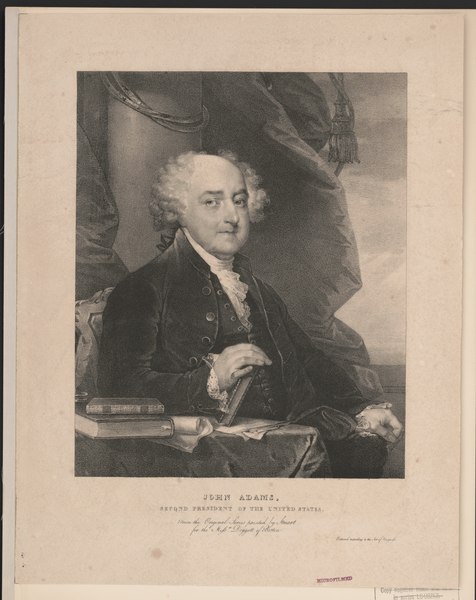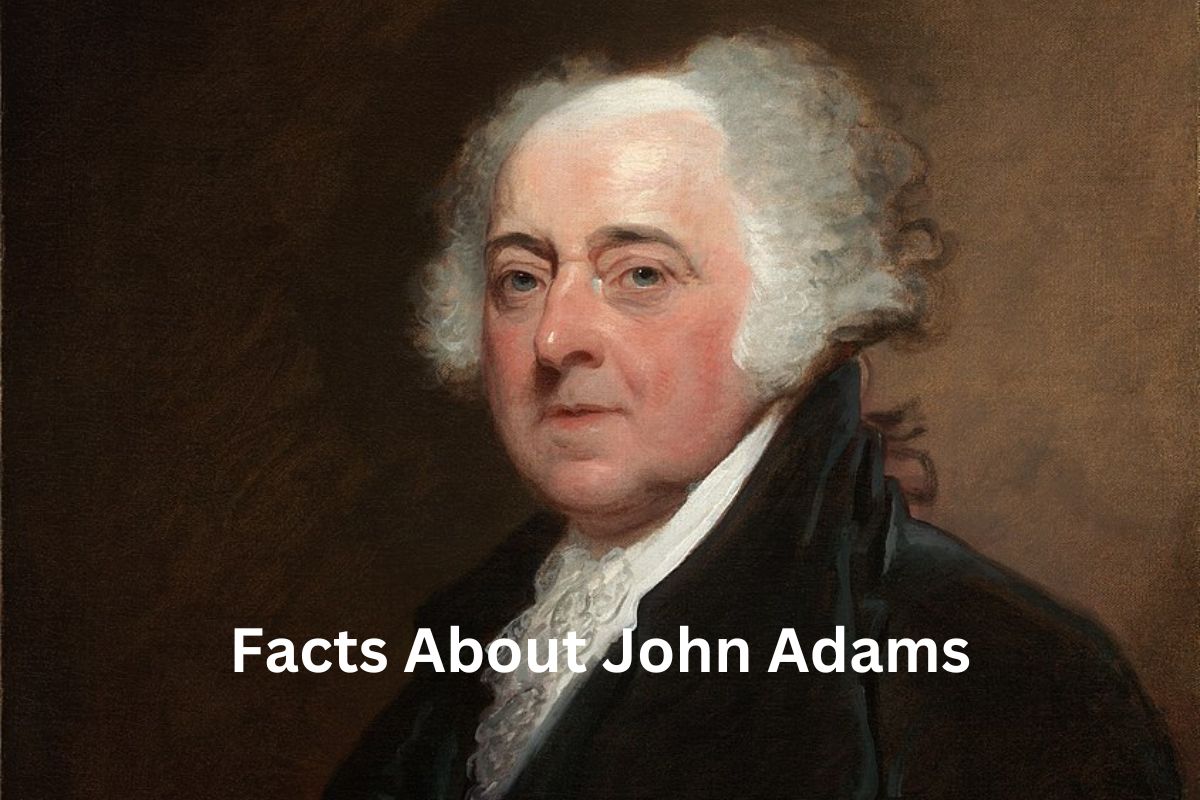John Adams, the second President of the United States, was a pivotal figure in American history. Born on October 30, 1735, Adams played a crucial role in the founding of the United States and the American Revolution.
As a statesman, diplomat, and lawyer, he contributed to the drafting of the Declaration of Independence and served as a diplomat in Europe, negotiating the Treaty of Paris that ended the Revolutionary War.
Adams’s presidency was marked by his steadfast support for a strong central government and his commitment to the peaceful transfer of power. His legacy extends beyond his presidency, as he was part of a remarkable father-son presidential duo with his son, John Quincy Adams.
John Adams’s intellectual pursuits, deep friendships, and advocacy for education further solidify his place as a notable figure in American history.
John Adams Facts
1. John Adams was the second President of the United States, serving from 1797 to 1801
John Adams served as the second President of the United States from 1797 to 1801. He was elected in 1796, defeating Thomas Jefferson in a hotly contested election.
Adams was a member of the Federalist Party and succeeded George Washington, who had served as the nation’s first President.

2. Adams was born on October 30, 1735, in Braintree, Massachusetts (now Quincy)
Born on October 30, 1735, in Braintree, Massachusetts (now Quincy), John Adams was the eldest son of John Adams Sr. and Susanna Boylston Adams.
Also Read: John Adams Accomplishments
His father was a farmer and a deacon in the Congregational Church, while his mother came from a prominent family. Adams received a formal education and attended Harvard College, where he studied law.
3. Prior to his presidency, Adams played a crucial role in the American Revolution
Prior to his presidency, John Adams played a significant role in the American Revolution and the formation of the United States. In 1774, he attended the First Continental Congress, where he advocated for the rights of the American colonies and pushed for resistance against British policies.
Adams was a passionate advocate for independence and was instrumental in the drafting of the Declaration of Independence in 1776. He served on the committee responsible for drafting the document and played a key role in its formulation.
Also Read: John Adams Timeline
During the Revolutionary War, Adams held diplomatic positions in Europe. He traveled to France in 1778 and worked alongside Benjamin Franklin and John Jay to negotiate the Treaty of Paris in 1783.
The treaty formally recognized the United States as an independent nation and secured favorable terms, including territorial gains and trade rights.
4. Adams was one of the Founding Fathers of the United States and actively participated in the drafting of the Declaration of Independence
John Adams’s involvement in the founding of the United States extended beyond the Declaration of Independence. In 1770, he took on the controversial task of defending the British soldiers involved in the Boston Massacre.
Despite his own patriotic sentiments, Adams believed in the importance of upholding the principle of the rule of law and providing a fair trial for all. His successful defense of the soldiers helped establish his reputation as a skilled lawyer and advocate for justice.

5. Adams served as Vice President under George Washington from 1789 to 1797
From 1789 to 1797, John Adams served as Vice President under President George Washington. As Vice President, Adams played a significant role in the early years of the American government.
He presided over the Senate and worked to define the role and responsibilities of the Vice Presidency.
Adams’s experience in this role contributed to the evolving understanding of the Vice President’s position as a valuable advisor to the President and a key member of the executive branch.
6. Adams was a strong advocate for a centralized government and a balanced system of powers
As a Federalist, John Adams championed a strong central government and believed in the importance of a balanced system of powers.
He advocated for a powerful executive branch and a strong military, as he saw these elements as crucial for the stability and security of the young nation.
This perspective sometimes put him at odds with Thomas Jefferson and his Democratic-Republican allies, who favored more power for state governments and emphasized individual liberties.
7. Despite being a Federalist and having policy differences with his successor, Thomas Jefferson
One of the remarkable aspects of John Adams’s presidency is the peaceful transition of power that occurred after he lost the 1800 presidential election to Thomas Jefferson.
Despite their political differences, Adams willingly handed over the reins of power to Jefferson, upholding the principle of a peaceful transfer of power and setting an essential precedent for future presidential transitions. This act solidified the stability and democratic nature of the United States’ political system.
8. Adams’s wife, Abigail Adams, was an influential figure during his presidency
John Adams’s wife, Abigail Adams, played a significant role in his presidency and in shaping the early years of the United States. Abigail Adams was known for her intelligence, strong character, and keen political insights.
She offered valuable advice and counsel to her husband, discussing matters of policy, diplomacy, and governance.
Their correspondence, preserved in their letters, provides a unique historical record of the era and offers a glimpse into their personal and political lives. Abigail Adams’s influence and contributions have earned her a place among the notable First Ladies of the United States.
9. Adams’s son, John Quincy Adams, also became a U.S. President, serving from 1825 to 1829
John Adams’s son, John Quincy Adams, also served as the sixth President of the United States from 1825 to 1829.
Also Read: Achievements of John Quincy Adams
John Quincy Adams had a distinguished political career of his own, which included serving as Secretary of State under President James Monroe before assuming the presidency.
The Adams family’s dual presidential legacy is a unique aspect of American history and reflects their deep commitment to public service.
10. After his presidency, Adams retired to his family farm in Quincy, Massachusetts
After his presidency, John Adams retired to his family farm in Quincy, Massachusetts. He named the property “Peacefield” to commemorate his role in securing peace and independence for the United States.
Despite his retirement, Adams remained active in intellectual pursuits and continued his prolific writing career. He authored several books and corresponded with various influential figures of the time, engaging in lively discussions on politics, philosophy, and history.
11. Adams and Thomas Jefferson, once political rivals, developed a close friendship later in life
John Adams and Thomas Jefferson had a remarkable relationship that evolved from political rivals to close friends. Despite their differing political ideologies and intense debates during the early years of the United States, they eventually developed a deep mutual respect and friendship.
In their later years, they engaged in an extensive and remarkable correspondence, discussing a wide range of topics, including their shared experiences, political philosophy, and personal reflections. Their friendship is seen as a symbol of the spirit of reconciliation and unity that characterized the early years of the nation.
July 4, 1826, marked the 50th anniversary of the signing of the Declaration of Independence, and it was on this significant day that both John Adams and Thomas Jefferson passed away. Adams’s last words were reported to be, “Thomas Jefferson survives.”
However, unbeknownst to Adams, Jefferson had passed away a few hours earlier. Their deaths on the same day, coinciding with the nation’s jubilant celebration of independence, became a poignant and symbolic moment in American history, further solidifying their legacy.
12. Adams was known for his strong convictions and outspoken nature
John Adams was renowned for his strong convictions and outspoken nature, making him a prominent figure in American politics. Throughout his career, he fearlessly expressed his beliefs and stood firmly behind his principles, often engaging in passionate debates with his political adversaries.
Adams’s unwavering commitment to his ideals earned him a reputation as a determined and forthright leader.
While his outspoken nature sometimes drew criticism, Adams’s integrity and dedication to his principles were widely respected. He was regarded as a man of unwavering character and a passionate advocate for the values he held dear.
Adams’s strong convictions and fearless expression of his views contributed to his enduring legacy as an influential and impactful figure in American history.
13. In addition to his political career, Adams was an avid reader and scholar
In addition to his political career, John Adams was known for his intellectual pursuits and love of learning. He had a keen interest in philosophy, law, and classical literature. His personal library, which he carefully curated throughout his life, contained a vast collection of books and served as a foundation for the establishment of the Boston Public Library.
Adams believed in the importance of education and access to knowledge, and his efforts contributed to the growth of public libraries in the United States, leaving a lasting impact on American culture and education.
